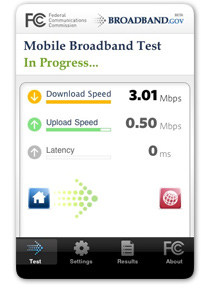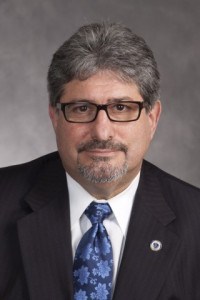
Verizon’s moratorium on further expansion of its fiber to the home service will continue for “the next couple of years.”
Verizon FiOS won’t be coming soon to a home near you, unless that home is inside a community with a standing agreement with the phone company.
Verizon CEO Lowell McAdam made it clear to attendees at Tuesday’s Goldman Sachs 22nd Annual Communacopia Conference his priority continues to be investing in the company’s highly profitable wireless business, while the company’s wired infrastructure is being targeted for more cost cutting, especially in areas designated to see existing copper infrastructure decommissioned. As for expanding FiOS into new communities, McAdam said he instead preferred to concentrate on improving market share and profits for the next few years in areas already getting the fiber optic service.
McAdam noted John Stratton, president of Verizon Enterprise Solutions, has been hard at work pruning Verizon’s wireline products and services targeted to business and government customers.
“I think [he] killed about 2,000 products this year, and we have taken 350 systems offline last year,” McAdam noted. “I think we are already at 250 this year. That sort of discipline gives you the ability to streamline your infrastructure.”
For residential customers, Verizon has two sets of offerings: one for customers served by FiOS fiber optics, the other for customers unlikely to see fiber upgrades indefinitely.
Inside Existing FiOS Service Areas
“We are doing some major technology shifts within FiOS to make it more efficient,” McAdam said. “We’re going to concentrate there for the next couple of years.”
McAdam’s signals to Wall Street were loud and clear: no more FiOS expansion into new communities for now.

McAdam
Instead, Verizon will focus on improving existing service in several key areas:
- Verizon has almost two million optical terminals that McAdam says were active at one point and are now sitting idle, suggesting FiOS has won and lost nearly two million customers since launching, either because the customer switched providers or moved away. McAdam said he wants to improve Verizon FiOS’ product set enough to attract those customers back. He noted with the terminals and cables already in place, the capital costs to win back a former customer are near zero;
- Verizon is introducing a new terminal this fall. Verizon’s FiOS Media Server “eliminates the requirement for coax, once you get into the optical terminal in the basement or wherever in the house,” McAdam said. “That slashes the installation time, and therefore makes the product a lot more profitable for us going forward. It eliminates set-top boxes, it is all IP-based going forward.”
- Verizon will continue to expand Verizon FiOS, particularly in New York City where it has a commitment to offer service.
Verizon FiOS has managed to build a much larger market share than its nearest neighbor, AT&T U-verse. McAdam claimed Verizon FiOS has achieved a 39 percent market share in broadband and around 34 percent on its television service so far. McAdam’s goal is to boost that to 45 percent. In areas of Texas where Verizon first introduced its FiOS fiber optic service, the company already has a penetration rate above 50 percent for broadband and 50 percent for television, demonstrating room to grow market share. AT&T’s U-verse TV penetration rate is 20.1 percent.
For Those Unserved by FiOS

Verizon’s 4G LTE Broadband Router with Voice
Except for Fire Island, N.Y., there are no significant announcements of FiOS expansion. Instead, Verizon has focused on investing to improve its wireless 4G LTE cell networks with the hope existing landline customers will consider switching to higher-profit wireless service. An attempted trial of Verizon Voice Link, intended to be an entry-level wireless replacement of landline service, failed badly on Fire Island due to an avalanche of complaints about poor quality reception, dropped and incomplete calls, and lack of support for data.
Now Verizon is back with a new offering, its 4G LTE Broadband Router with Voice ($49.99 2-yr contract with $175 early termination fee/$199.99 month-to-month).
“Securely connect wired and wireless devices to the 4G LTE network, and connect your landline phone to make calls,” Verizon’s website says. “Combine voice and data on a Share Everything Plan for added savings.”
The device can function as both a wireless landline replacement and router for data. The unit includes three Ethernet ports and Wi-Fi to share your connection. A landline phone or cordless phone base station can be plugged in as well.
Verizon charges an extra $20 a month for Home Service Monthly Line Access on Share Everything Plans, which covers your telephone service. Customers get unlimited local, long distance, call forwarding, call waiting, three-way calling, and voice mail. 911 is available, but Verizon disclaims any responsibility if you cannot reach an operator. The device also supports TTY-TTD calling.
Verizon claims users can expect 5-12Mbps downloading and 2-5Mbps uploading on Verizon’s 4G network, assuming there is solid coverage where you use the device. Usage caps apply. A backup battery keeps the service running for up to four hours of voice calling in the event of a power outage.
McAdam admitted the thing that keeps him up most at night are regulatory issues. He particularly called out Europe, which he believes is hostile for investment. But Europeans pay considerably less for wireless service than North Americans pay, and often have more choices due to competition and regulatory oversight.
“I think the beauty of the ’96 Telecom Act was that it was such a light touch on broadband and mobile,” said McAdam. “And that is — and I sit in Europe talking to investors all the time — that is the biggest difference between the U.S. and Europe.”
To head the FCC off from pursuing any additional regulatory oversight, McAdam claims he reluctantly approved Verizon’s lawsuit against the government on Net Neutrality.
“We have had to take some positions, frankly, that we didn’t want to take,” McAdam said of the lawsuit. “It opened the door for them to get into price regulation of broadband. And I think that is not their charter, and I think it would be a mistake for the U.S. economy and certainly the telecommunications ecosystem.”
[flv width=”488″ height=”300″]http://www.phillipdampier.com/video/Verizon 4G LTE Broadband Router with Voice 9-25-13.flv[/flv]
Verizon Wireless’ latest 4G LTE router supports wireless landline service and 4G data. (1 minute)
 As Dr. John Malone positions his pieces on the cable industry’s chess board to win back the title of King of Big Cable, it is important to consider history.
As Dr. John Malone positions his pieces on the cable industry’s chess board to win back the title of King of Big Cable, it is important to consider history.

 Subscribe
Subscribe Are you getting the mobile broadband speeds your provider advertises for its whiz-bang 4G network? How do you know which carrier really delivers?
Are you getting the mobile broadband speeds your provider advertises for its whiz-bang 4G network? How do you know which carrier really delivers?
 A sweeping deregulation measure sponsored by Verizon Communications would end the telephone company’s obligation to provide landline service and remove state-mandated customer quality of service standards in Massachusetts.
A sweeping deregulation measure sponsored by Verizon Communications would end the telephone company’s obligation to provide landline service and remove state-mandated customer quality of service standards in Massachusetts.




